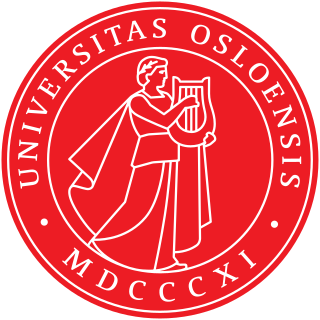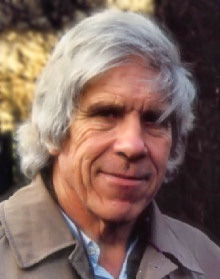
John Maynard Smith was a British theoretical and mathematical evolutionary biologist and geneticist. Originally an aeronautical engineer during the Second World War, he took a second degree in genetics under the well-known biologist J. B. S. Haldane. Maynard Smith was instrumental in the application of game theory to evolution with George R. Price, and theorised on other problems such as the evolution of sex and signalling theory.

The University of Oslo is a public research university located in Oslo, Norway. It is the highest ranked and oldest university in Norway. It is consistently ranked among the top universities in the world and as one of the leading universities of Northern Europe; the Academic Ranking of World Universities ranked it the 58th best university in the world and the third best in the Nordic countries. In 2016, the Times Higher Education World University Rankings listed the university at 63rd, making it the highest ranked Norwegian university.

William Donald Hamilton was a British evolutionary biologist, recognised as one of the most significant evolutionary theorists of the 20th century.

Evolutionary biology is the subfield of biology that studies the evolutionary processes that produced the diversity of life on Earth. It is also defined as the study of the history of life forms on Earth. Evolution holds that all species are related and gradually change over generations. In a population, the genetic variations affect the phenotypes of an organism. These changes in the phenotypes will be an advantage to some organisms, which will then be passed onto their offspring. Some examples of evolution in species over many generations are the peppered moth and flightless birds. In the 1930s, the discipline of evolutionary biology emerged through what Julian Huxley called the modern synthesis of understanding, from previously unrelated fields of biological research, such as genetics and ecology, systematics, and paleontology.

Leigh Van Valen was a U.S. evolutionary biologist. At the time of his death, he was professor emeritus in the Department of Ecology and Evolution at the University of Chicago.
"Resurrection ecology" is an evolutionary biology technique whereby researchers hatch dormant eggs from lake sediments to study animals as they existed decades ago. It is a new approach that might allow scientists to observe evolution as it occurred, by comparing the animal forms hatched from older eggs with their extant descendants. This technique is particularly important because the live organisms hatched from egg banks can be used to learn about the evolution of behavioural, plastic or competitive traits that are not apparent from more traditional paleontological methods.
Tore Schweder is a Norwegian statistician and is a professor at the Department of Economics and at the Centre for Ecology and Evolutionary Synthesis at the University of Oslo. Schweder has worked with scientists in a number of fields, including medicine, demography, sociology, economics, ecology, genetics and fisheries. Since 1990, most of his applied work has been concerned with assessment of marine resources, and with the problem of uncertainty in fisheries management. His methodological research interests also include basic connections between likelihood and confidence, cf. confidence distributions.

The Red Queen hypothesis is a hypothesis in evolutionary biology proposed in 1973, that species must constantly adapt, evolve, and proliferate in order to survive while pitted against ever-evolving opposing species. The hypothesis was intended to explain the constant (age-independent) extinction probability as observed in the paleontological record caused by co-evolution between competing species; however, it has also been suggested that the Red Queen hypothesis explains the advantage of sexual reproduction at the level of individuals, and the positive correlation between speciation and extinction rates in most higher taxa.
The Centre for Development and the Environment is a research institute which is part of the University of Oslo. Its focus areas are international development and environmental studies.
The ECI Prize is a prize awarded annually from 1986 onwards to an ecologist distinguished by outstanding and sustained scientific achievements. It is awarded jointly by the International Ecology Institute, a non-profit organization of research ecologists based in Germany dedicated to fostering ecological knowledge and awareness, and the Otto Kinne Foundation.
Leif Randulff Ryvarden is a Norwegian mycologist.
The Nansen Medal for Outstanding Research is a Norwegian medal awarded by the Nansen Fund.

Ole Petter Ottersen is a Norwegian physician and neuroscientist. He serves as the Rector of Karolinska Institute in Sweden, and took office in August 2017. Ottersen has been professor of medicine at the University of Oslo since 1992 and served as the university's directly elected Rector from 2009 to 2017.

The court jester hypothesis is used in reference to the idea that abiotic forces, rather than biotic competition between species, function as a major driving force behind the processes in evolution which produce speciation. In evolutionary theory, the court-jester hypothesis contrasts the Red Queen hypothesis.
The Norwegian Centre for Human Rights is a multidisciplinary research centre at the University of Oslo Faculty of Law. From 2001 to 2015 it was also the ICC (UN) accredited Norwegian national human rights institution.

Hugh David Loxdale is an entomologist. He was professor of ecology at the Institute of Ecology, University of Jena from 2009 to 2010, president of the Royal Entomological Society from 2004 to 2006, and honorary visiting professor at the School of Biosciences, Cardiff University. Loxdale works on the population biology, ecology, and genetics of insects, especially aphids and their wasp parasitoids.
The Research Council of Norway's Award for Excellence in Communication of Science is awarded annually by the Research Council of Norway, a Norwegian government body. According to its bylaws, the prize is to be given in order to "reward and stimulate the dissemination of research to a broad audience. The dissemination must be of high quality in both form and content." The price is worth 500000 kr.

Olav Sigurd Kjesbu is a Norwegian fisheries biologist/Chief Scientist at the Institute of Marine Research (IMR) in Bergen. He is the director of the Hjort Centre for Marine Ecosystem Dynamics. Bergen is one of the largest marine knowledge hubs in the world and the Hjort Centre is a central part of this research cluster. In addition he also holds a position as adjunct professor at Centre for Ecological and Evolutionary Synthesis, University of Oslo, Oslo. Kjesbu got his PhD in 1988 and became principal scientist in 1996. His research expertise falls within reproductive biology and recruitment dynamics of marine fish. He is an expert on Northeast Atlantic cod, currently the largest cod stock in the world. Kjesbu has been active in or leading development co-operation projects, especially with Centro Investigaciones Pesqueras, Havana through the Norwegian Agency for Development Cooperation.

Maciej Gliwicz is a Polish biologist, evolutionist and professor at the University of Warsaw who specializes in the field of hydrobiology.









